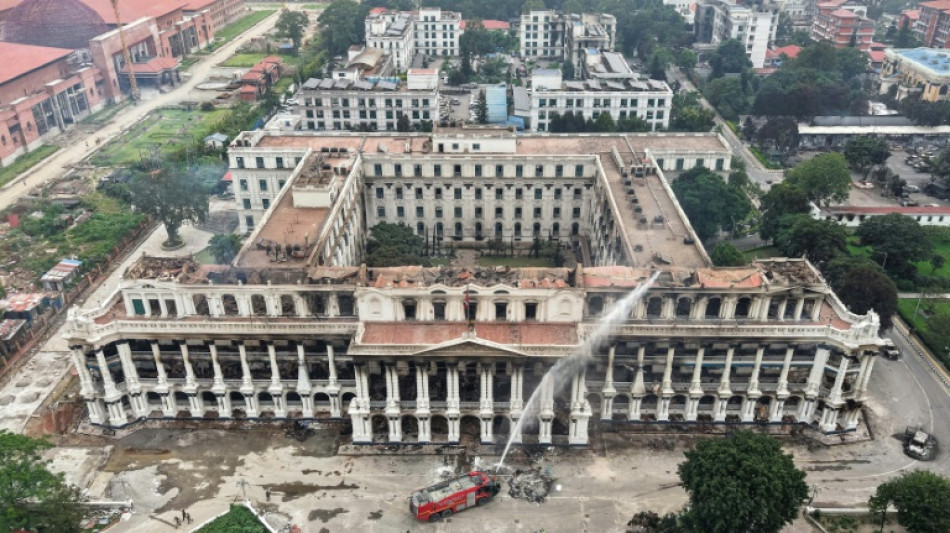
-
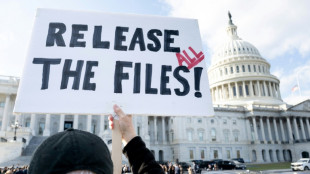 US lawmakers set for explosive vote on Epstein files
US lawmakers set for explosive vote on Epstein files
-
Gianfranco Rosi: the slow documentary maker in a frantic world
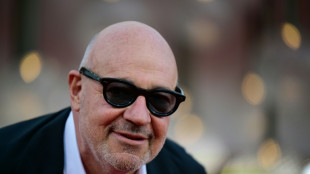
-
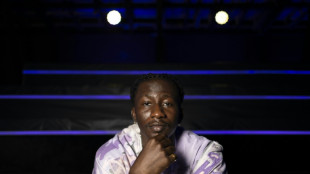 P.Priime, Nigeria's young leading Afrobeats producer
P.Priime, Nigeria's young leading Afrobeats producer
-
Merz, Macron to push for European digital 'sovereignty'
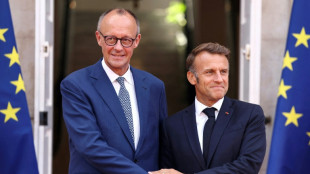
-
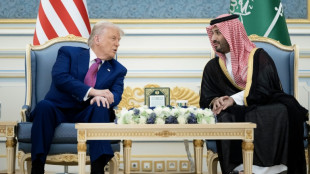 Trump hosts Saudi prince for first time since Khashoggi killing
Trump hosts Saudi prince for first time since Khashoggi killing
-
Tonga's Katoa out of NRL season after brain surgery

-
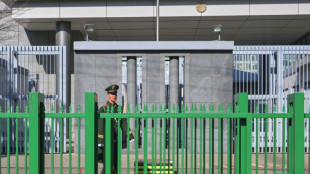 Japan warns citizens in China over safety amid Taiwan row
Japan warns citizens in China over safety amid Taiwan row
-
In Somalia, a shaky front line barely holds back the 'dogs of war'
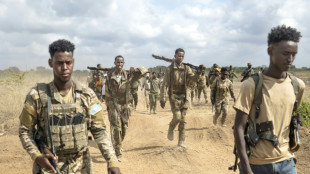
-
 Shares in 'Baby Shark' studio jump on market debut
Shares in 'Baby Shark' studio jump on market debut
-
Thunder breeze past Pelicans, Pistons overpower Pacers

-
 Grieving Cowboys remember Kneeland, defeat Raiders
Grieving Cowboys remember Kneeland, defeat Raiders
-
Loaf behind bars: Aussie inmate says Vegemite a human right

-
 In film's second act, 'Wicked' goes beyond Broadway musical
In film's second act, 'Wicked' goes beyond Broadway musical
-
Asian markets track Wall St down with Nvidia, US jobs in view
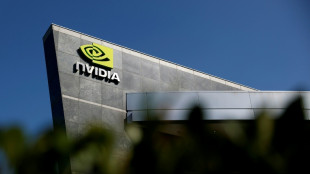
-
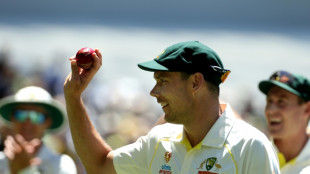 Scott Boland: the best 'spare' fast bowler around
Scott Boland: the best 'spare' fast bowler around
-
Fire and Ashes: England bank on fast bowling barrage in Australia

-
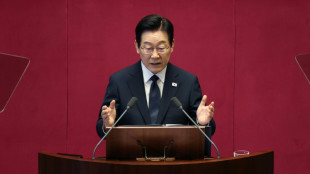 North Korea says Seoul-US sub deal will trigger 'nuclear domino' effect
North Korea says Seoul-US sub deal will trigger 'nuclear domino' effect
-
Education for girls hit hard by India's drying wells
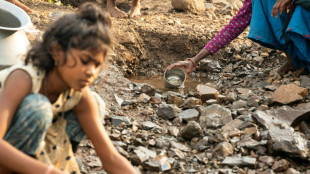
-
 Haitian gangs getting rich off murky market for baby eels
Haitian gangs getting rich off murky market for baby eels
-
Trump says will talk to Venezuela's Maduro, 'OK' with US strikes on Mexico
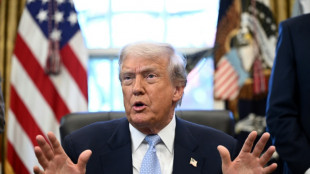
-
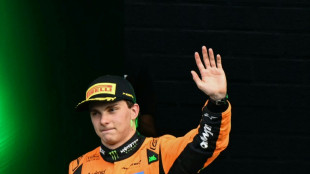 Oscar Piastri wins Australia's top sports honour
Oscar Piastri wins Australia's top sports honour
-
'Severely restricted': Russia's Saint Petersburg faces cultural crackdown
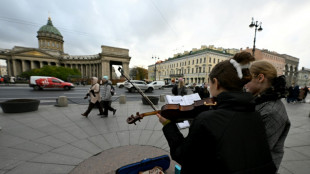
-
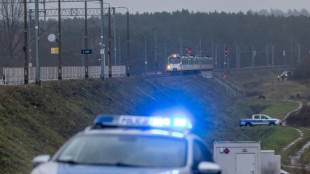 Polish PM denounces 'sabotage' of railway supply line to Ukraine
Polish PM denounces 'sabotage' of railway supply line to Ukraine
-
UK toughens asylum system with radical overhaul

-
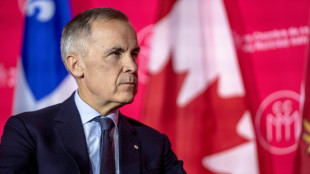 Carney's Liberals pass budget, avoiding snap Canada election
Carney's Liberals pass budget, avoiding snap Canada election
-
LeBron back in training, edges closer to Lakers return

-
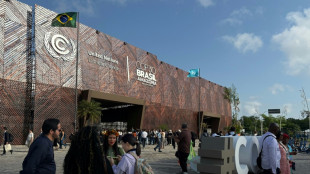 Climate talks run into night as COP30 hosts seek breakthrough
Climate talks run into night as COP30 hosts seek breakthrough
-
Germany and Netherlands lock up World Cup spots in style

-
 Germany's Woltemade hopes for 2026 World Cup spot after scoring again
Germany's Woltemade hopes for 2026 World Cup spot after scoring again
-
Germany 'send message' with Slovakia rout to reach 2026 World Cup

-
 Trump unveils fast-track visas for World Cup ticket holders
Trump unveils fast-track visas for World Cup ticket holders
-
Netherlands qualify for World Cup, Poland in play-offs

-
 Germany crush Slovakia to qualify for 2026 World Cup
Germany crush Slovakia to qualify for 2026 World Cup
-
Stocks gloomy on earnings and tech jitters, US rate worries

-
 'In it to win it': Australia doubles down on climate hosting bid
'In it to win it': Australia doubles down on climate hosting bid
-
Former NFL star Brown could face 30 yrs jail for shooting case: prosecutor

-
 Fate of Canada government hinges on tight budget vote
Fate of Canada government hinges on tight budget vote
-
New research measures how much plastic is lethal for marine life

-
 Mbappe, PSG face off in multi-million lawsuit
Mbappe, PSG face off in multi-million lawsuit
-
EU defends carbon tax as ministers take over COP30 negotiations

-
 McCartney to release silent AI protest song
McCartney to release silent AI protest song
-
Stocks tepid on uncertainty over earnings, tech rally, US rates

-
 Louvre shuts gallery over ceiling safety fears
Louvre shuts gallery over ceiling safety fears
-
'Stranded, stressed' giraffes in Kenya relocated as habitats encroached

-
 US Supreme Court to hear migrant asylum claim case
US Supreme Court to hear migrant asylum claim case
-
Western aid cuts could cause 22.6 million deaths, researchers say

-
 Clarke hails Scotland 'legends' ahead of crunch World Cup qualifier
Clarke hails Scotland 'legends' ahead of crunch World Cup qualifier
-
S.Africa says 'suspicious' flights from Israel show 'agenda to cleanse Palestinians'

-
 South Korea pledges to phase out coal plants at COP30
South Korea pledges to phase out coal plants at COP30
-
Ex-PSG footballer Hamraoui claims 3.5m euros damages against club


After protests oust PM, Nepal stares into political void
Shaken by deadly protests that ousted its veteran prime minister and set parliament ablaze, Nepal faces the pressing question of who will step into the political void.
In the short term, the army has taken charge of the nation of 30 million people since the protests escalated on Tuesday.
Nepali Army chief, General Ashok Raj Sigdel met Wednesday with key figures and "representatives of Gen Z", an army spokesman said, referring to the loose umbrella title of the young protesters, without giving further details.
But analysts warn that finding a "transitional arrangement" that carries legitimacy with ordinary Nepalis, especially disaffected youth, may prove a thorny task.
Here are the possible power brokers.
- President and parliament -
Sushila Karki, 73, a former Supreme Court chief justice who many see as a potential interim leader, said talks between parties were critical.
"Experts need to come together to figure out the way forward", Karki told AFP. "The parliament still stands."
Constitutionally, President Ramchandra Paudel, 80, holder of the largely cermonial post, should invite the leader of the largest parliamentary party to form a government.
But much of the political old guard has vanished from view.
"The anger... goes much beyond the prime minister, targeting the entire political class", Crisis Group analyst Ashish Pradhan said.
The Himalayan nation became a federal republic in 2008 after a decade-long civil war ended with a peace deal that integrated former Maoist rebels into government.
It last held general elections in 2022.
- Gen Z -
Nepali youth, bowed down by unemployment and limited opportunities, hit a breaking point this week, furious at ruling class they see as out of touch and corrupt.
The protests were sparked not by a single party but in response to the government's short-lived social media ban, which galvanised thousands of young demonstrators.
Karki, the former chief minister, commands respect.
Others with traction among the young are Balendra Shah, 35, a rapper-turned-engineer who won Kathmandu’s mayoral race in 2022.
Also key is Sudan Gurung, in his 30s, a leader of youth rights group Hami Nepal.
The young protesters insist they were nothing to do with the extreme violence on Tuesday, when government buildings and tower blocks were torched.
"The important thing right now is for Gen Z, and this whole movement, to come together and decide on a way forward," journalist Pranaya Rana told AFP.
He warned that they should "not allow their movement to be hijacked by opportunists waiting in the shadows".
- Old guard -
Communist party veteran KP Sharma Oli, 73, a four-time prime minister, resigned Tuesday in the face of protests. His whereabouts are unknown.
His former coalition ally, 79-year-old Sher Bahadur Deuba of the Nepali Congress –- a five-time prime minister -- has not been seen since unrest erupted.
Oli had struck a deal with Deuba to share power during the current parliamentary term, but both men have now been swept aside by public fury.
- Ex-king -
Nepal's monarchy ended in 2008 when Gyanendra Shah was forced from power, ending 240 years of royal rule.
Some public support for the deposed king has since grown -- in tandem with dissatisfaction with ruling politicians.
But despite the extraordinary speed of political events this month, his return remains unlikely.
"The restoration of the monarchy -- even in a ceremonial role -- would pose major risks of a return to autocratic rule", the Crisis Group said.
S.AbuJamous--SF-PST
